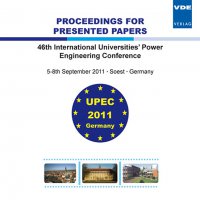Efficient Utilization of Photovoltaic Energy for Supplying of Remote Electric Loads
Konferenz: UPEC 2011 - 46th International Universities' Power Engineering Conference
05.09.2011 - 08.09.2011 in Soest, Germany
Tagungsband: UPEC 2011
Seiten: 5Sprache: EnglischTyp: PDF
Persönliche VDE-Mitglieder erhalten auf diesen Artikel 10% Rabatt
Autoren:
El-Sayed, Mohamed A.; Al-Naseem, Osama A. (Electrical Engineering Department, College of Engineering and Petroleum, Kuwait University, Kuwait)
Inhalt:
The increasing concern of environmental pollution, high oil price and limited oil reserves are pushing the substitution potential of fossil fuel by renewable energy such as wind and solar. By solar energy, electricity can be generated by photovoltaic cells, which convert the irradiance directly into electrical energy. There are many applications of solar energy in residential, commercial, industrial and agricultural sectors as well as electrification of remote areas. In this paper an efficient solar green energy scheme comprising of PV array and MPPT DC-DC converter, boost chopper to interface the PV array with the DC load. In this paper, the MPPT is achieved using DC boost converter through perturb-observe technique. In addition, on-line tuned controller is used to regulate the chopper for stabilizing the converter voltage and speed of the PMDC motor. Sliding mode control (SMC) is still the most common controlling scheme due to its simplicity, robustness and successful wide application in electronic converters. The main problem by this control strategy is the appropriate tuning of the controller parameters. In this paper, the integral minimization of time-weighted absolute error (ITAE) is used for on-line tuning of the controller parameters. The Matlab optimization toolbox offers different algorithms for solving constrained and unconstrained minimization problems. The on-line parameter tuning is achieved using unconstrained optimization technique. The proposed system with all models of its components models and the on-line tuned controller has been simulated using Simulink/Simpower environment and validated for efficient utilization of solar energy and stabilizing the motor speed and minimizing the converter voltage oscillations.


